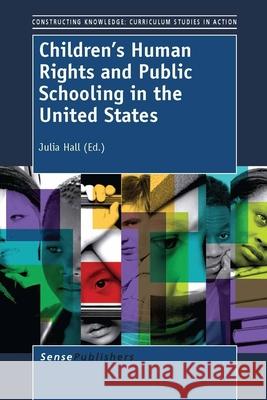Children's Human Rights and Public Schooling in the United States » książka
Children's Human Rights and Public Schooling in the United States
ISBN-13: 9789462091955 / Angielski / Miękka / 2013 / 222 str.
Children's Human Rights and Public Schooling in the United States
ISBN-13: 9789462091955 / Angielski / Miękka / 2013 / 222 str.
(netto: 234,73 VAT: 5%)
Najniższa cena z 30 dni: 235,36
ok. 22 dni roboczych.
Darmowa dostawa!
The United States tends to portray itself as a human rights leader. However, human rights concerns are confronted everyday by people in this democracy, including children. The purpose of this volume is to bring attention to the fact that against the backdrop of neoliberal expansion, serious human rights violations are taking place among children everywhere, including in the US. The daily struggles among groups of school children in the US are specifically considered here, such as children who are sorted by race, homeless children, transient children, child refugees, children as targeted by human traffickers, and/or child migrant workers. As the economy continues to constrict, more and more young people find themselves struggling to grow up on these razor thin margins of survival. Given current economic arrangements, such margins are widening. The definition of "children's human rights" as understood in this analysis is taken directly from the UN Convention on the Rights of the Child CRC]. Here emphasis is placed on ways in which the CRC could be used to serve more effectively the needs of the most vulnerable populations of school-age children in the US and elsewhere. Public schools could be the very place where children come to understand they have rights. Unfortunately, many children do not get this information. Instead the protections stated in the CRC and the realities of the lives of so many children are often worlds apart. This volume sets out to be a part of changing this.
The United States tends to portray itself as a human rights leader. However, human rights concerns are confronted everyday by people in this democracy, including children. The purpose of this volume is to bring attention to the fact that against the backdrop of neoliberal expansion, serious human rights violations are taking place among children everywhere, including in the US. The daily struggles among groups of school children in the US are specifically considered here, such as children who are sorted by race, homeless children, transient children, child refugees, children as targeted by human traffickers, and/or child migrant workers. As the economy continues to constrict, more and more young people find themselves struggling to grow up on these razor thin margins of survival. Given current economic arrangements, such margins are widening. The definition of "childrens human rights" as understood in this analysis is taken directly from the UN Convention on the Rights of the Child [CRC]. Here emphasis is placed on ways in which the CRC could be used to serve more effectively the needs of the most vulnerable populations of school-age children in the US and elsewhere. Public schools could be the very place where children come to understand they have rights. Unfortunately, many children do not get this information. Instead the protections stated in the CRC and the realities of the lives of so many children are often worlds apart. This volume sets out to be a part of changing this.











